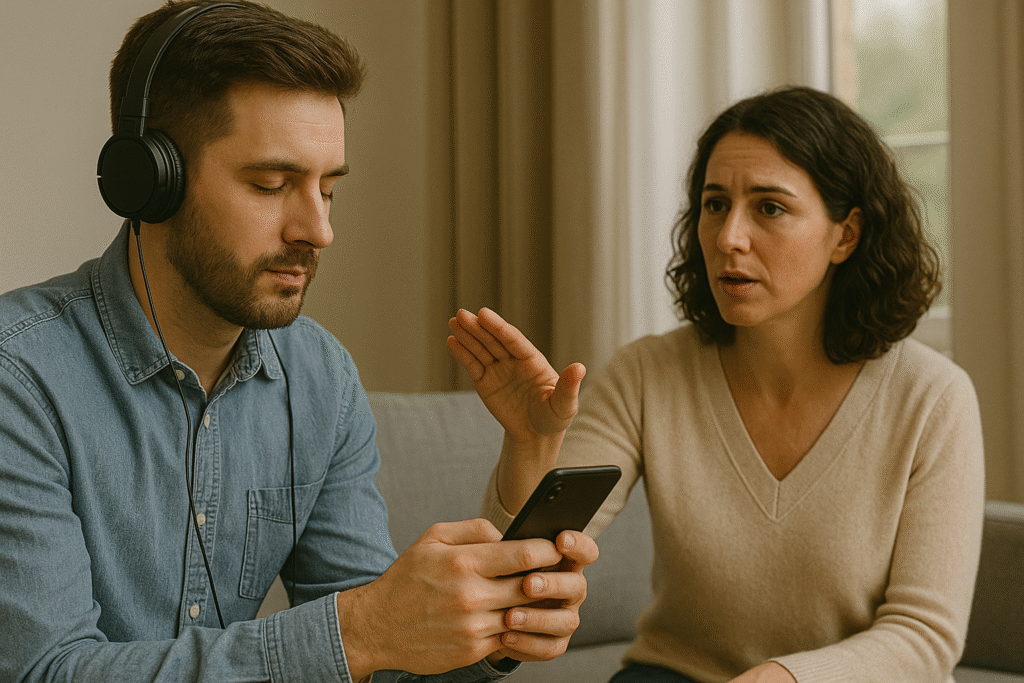I often have people ask whether or not audio files are worth the effort or the money. So I thought today on Hypnotic News we would talk about the benefits and downfalls of their use. When they are a good idea and when you should avoid them.
Let’s get started.
Audio Files
Audio files are recordings of hypnotic sessions that you can listen to at your own convenience. They are all over the web. Some are better than others. Some are scams. As far as that goes, its just like your hypnotist. You want to do your best to make sure that your hypnotist or your file creator is good at what they do and/or know what they are doing.
While I advocate audio files if you have no other options…an in person hypnotist is always better as far as I’m concerned. There are just too many things that an audio file can’t do. However, I want you to see the pros and cons yourself. Audio files can be a great tool for change that you can use by yourself. But they don’t always work the way you hope or cover all the things you need to (in all the ways you need it to).
Pros
- You can do hypnosis on your own time.
- Affordable way to start treatment
- You can relisten to them.
- You don’t have to work with someone else (potentially a pro for anxious or time constraints).
- Repetition can be good for getting your unconscious to accept suggestions.
Cons
- Only useful for general problems, not specific unless custom made.
- Is not tailored to your specific problem in most cases.
- You may get stuck as a file does not adapt to you, your modalities, or the specific way you think.
- Personal interaction can be beneficial for the best experience and an audio file cannot provide that.
- A file cannot help you find the root cause of a situation where a hypnotist can.
- A hypnotist can provide more interventions based on the current situation.
What You Need To Know
Before I went to my first clinical hypnotist I used recreational and therapeutic audio files. I knew I could be hypnotized, but I thought I was resistant to the process. What I learned is what I’m about to share with you now. The things I realized were good or not so good about audio files. I’ll share my experiences as well as the facts.
Below are a few of the things you need to consider before deciding whether or not to use an audio file or a hypnotist. So that you can make an informed decision. Which is the most important thing we want you to be able to do after reading this.
Audio Quality
One of the biggest things to consider when choosing an audio file or deciding if you want to, is quality. There is absolutely nothing more annoying than opening a file and hearing static. A poorly edited file is more distracting than useful. It can be hard to find out if a recording is decent without just buying one. Some places offer samples, others do not. In many cases, you will just have top hope you are not wasting the money or your time.
Creator
The second thing to consider is the person creating the files. You will likely do better if you already know that hypnotist is good at what they do. Some hypnotist offer files as well as private sessions. Others do not. Generally, if they provide good private session (you can likely figure this out from reviews or friends) they have decent audio files as well. But there is no guarantee of that. Some people are great at one aspect of a business and not so great at others.
Affordability
The greatest benefit to audio files is their affordability, but you still have to be careful about what you pay. Some hypnotist over charge for their files and what you get will not be as satisfying as a session. Others under charge, likely due to their files not being as great as they could be. Or because their audio session does not cover as much as their private sessions normally would. They may be a way for someone to lure you into actual sessions. While I personally find this abhorrent and dishonest, it happens. In addition, if you don’t find a hypnotist who uses the correct language for your modalities you may end up spending as much money finding the right files or give up on hypnosis entirely out of frustration.
Personalized Suggestions
I find that the quality of suggestions also varies greatly with audio files. Even if you get a great hypnotist, the last of a personal touch makes the suggestions iffy at best. Say for example, that you think with a feeling modality vs a visual. If they are not using the words that your mind will accept, then the file will be of no use. This is one of the many reasons I find a hypnotist better than an audio file. That file hasn’t spoken to you and doesn’t know your modality. It can’t adapt like a real person can. Which makes it the biggest problem I currently have with audio files as a whole.
In addition to this, you need to be aware that you should listen all the way through a file before you let yourself be suggestible to it. If you know you are highly suggestible you may want a good friend that you trust to check out the file for you. Make sure it doesn’t have any imagery that will trigger you (we’ll cover that a bit more in Abreactions). Also make sure that there are no suggestions that make you uncomfortable. While this is also a risk with a live hypnotist, I feel it can be more of a risk with an audio file. Where a hypnotist has the chance to ask questions and rule those things out, an audio file just can just be heard.
Adaptation
Like I mentioned above, a hypnotist can adapt while a file cannot. In addition to suggestions there are other adaptations that a hypnotist can make. What if that files induction doesn’t work or you don’t get deep enough to do the change. A person in person can see that and make corrections. I find that many people who have used audio files get mix results. They either do very well, or more often, they struggle, only getting limited results. This is the second biggest problem I’ve had with audio files.
Abreactions
Abreactions are an undesired reaction to hypnotic suggestions. They can be positive, but we often only notice them when they are negative. They can be a reaction to a set of wording or a landmine accidentally set off by something we didn’t even know bothered us. An example of the first is someone terrified of water. If a file uses that suggestion that person could freak out.
I’ll give you a personal example of the second, a landmine. A few years ago when I was doing some hypnosis training, I took an online course. It was videos and audio with some files to read, I had read the file before I listened to the exercise because I’m really picky about the suggestions I allow inside my own head. Nothing pulled a red flag for me so I listened to the audio file.
Nothing in there should have been triggering. It was an example of an induction, deepener, and stress reduction activities. Suffice it to say I was freaked out when I suddenly had a poor reaction to an innocent suggestion, remembering a traumatic event from my childhood that I had forgotten entirely. To this day, relistening to that file, I cannot determine what went wrong, but, in that instant for some reason, I had a bad reaction and no one there to help me with it. It was an awful experience. One that caused me to become a firm believer in my final point: happy places.
Now, having said all that, abreactions are fairly rare. In the time of our practice, between all our current hypnotist combined, we’ve had a handful of abreactions. That is over nearly 1000 clients at this point. It can happen but it unlikely and rare so long as you are honest and open with your hypnotist.
Happy Place
Not every hypnotist does this, but we do. It’s part of what sets us apart. Each client we work with we give a happy place before we do any intervention work. This is almost impossible to do efficiently with an audio file. If nothing else it would be hard to tell if it worked doing it with just an audio file.
A happy place is a suggestion we give all our clients. It’s the first thing we do. We take someone down into trance and have them find a place that is safe and that they are in control of. We work everything else from that point. My happy place was the only reason my personal abreaction was not far worse than it could have been. I went to happy place and was at least partially able to handle the reaction on my own, though it left me unsettled for a bit.
We call this our safety protocol and I think its one of the most important things that we do. Though not directly related, I feel it was important to mention after discussing abreactions and their effects.
Choose Wisely
I won’t tell you not to choose an audio file. I’ve used them myself in a pinch. They can be a great tool if they are great audio files. They can also do more harm than good, if the file is not as well worded as it should be.
If they are your best option financially I don’t begrudge you using them. Just make sure you are choosing wisely. That you aren’t putting suggestions into your head that are harmful or you would otherwise be opposed to. While I find a live hypnotist the better option, I can understand if you choose this first. But if you don’t find success with an audio file your first time, please try a real hypnotist before you give up on the practice. Everyone can be helped with hypnosis, if given the right cues.
Until next time take care and keep it trancy. If you want more information check out All About Hypnosis and Services. Our epicenters describing everything we do and how it works.



